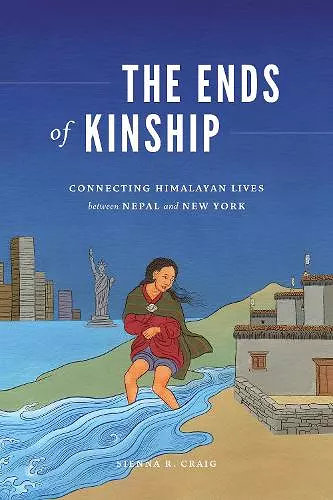The Ends of Kinship
Connecting Himalayan Lives between Nepal and New York
Sienna R Craig author Anand A Yang editor K Sivaramakrishnan editor Padma Kaimal editor
Format:Hardback
Publisher:University of Washington Press
Published:15th Oct '20
Currently unavailable, and unfortunately no date known when it will be back
This hardback is available in another edition too:
- Paperback£34.95(9780295747699)

What sustains and remakes family and community through migration?For centuries, people from Mustang, Nepal, have relied on agriculture, pastoralism, and trade as a way of life. Seasonal migrations to South Asian cities for trade as well as temporary wage labor abroad have shaped their experiences for decades. Yet, more recently, permanent migrations to New York City, where many have settled, are reshaping lives and social worlds. Mustang has experienced one of the highest rates of depopulation in contemporary Nepal—a profoundly visible depopulation that contrasts with the relative invisibility of Himalayan migrants in New York.
Drawing on more than two decades of fieldwork with people in and from Mustang, this book combines narrative ethnography and short fiction to engage with foundational questions in cultural anthropology: How do different generations abide with and understand each other? How are traditions defended and transformed in the context of new mobilities? Anthropologist Sienna Craig draws on khora, the Tibetan Buddhist notion of cyclic existence as well as the daily act of circumambulating the sacred, to think about cycles of movement and patterns of world-making, shedding light on how kinship remains both firm and flexible in the face of migration. From a high Himalayan kingdom to the streets of Brooklyn and Queens, The Ends of Kinship explores dynamics of migration and social change, asking how individuals, families, and communities care for each other and carve out spaces of belonging. It also speaks broadly to issues of immigration and diaspora; belonging and identity; and the nexus of environmental, economic, and cultural transformation.
"[A] beautifully rendered account of a community in flux, caught in the interstices between the remote, high-altitude landscapes of windswept Mustang and the bustling, multi-cultural cityscapes of New York City."
* New Books Network (NBN) *"This book will hold the attention of anyone interested in Nepal, migration, or diasporic experiences. It is complex yet accessible."
* IIAS Newsletter (International Institute for Asian Studies) *"The humanity underpinning The Ends of Kinship and the beauty of its writing are bound to inspire new scholars whose motivations for entering the discipline are not strictly intellectual; those looking for an ‘anthropology of care’ need look no further."
* Social Anthropology *"[A] refreshing mixed-genre narrative about mobility and migration. Craig not only mixes and merges the two writing styles offiction and ethnography, she also makes the subjects of her ethnographic research come alive, just like the characters in herfictional stories."
* Journal of Asian Studies *"[A] remarkable ethnography of connection across geographical, temporal, socio-cultural, political, and economic borders."
* HIMALAYA: The Journal of the Association for Nepal and Himalayan Studies *"[T]he chapters rebound off each other, and together provide striking image of kinship in migration and change. The effect is impressive. The fiction is as ethnographically real as the ethnography is literarily true. This is a gorgeous book, one that is hard to put down, one that I would unhesitatingly recommend to anyone at all, and a book which I think conveys the power of kinship in a manner that anyone will be able to tap into, that anyone can relate to."
* Kinship *"Very accessible for undergraduates in anthropology, Asian studies, or Asian American studies, this book also presents an important model for how we might engage in ethical and practical ethnography in the twenty-first century."
* Journal of Asian StudiISBN: 9780295747682
Dimensions: unknown
Weight: 590g
304 pages